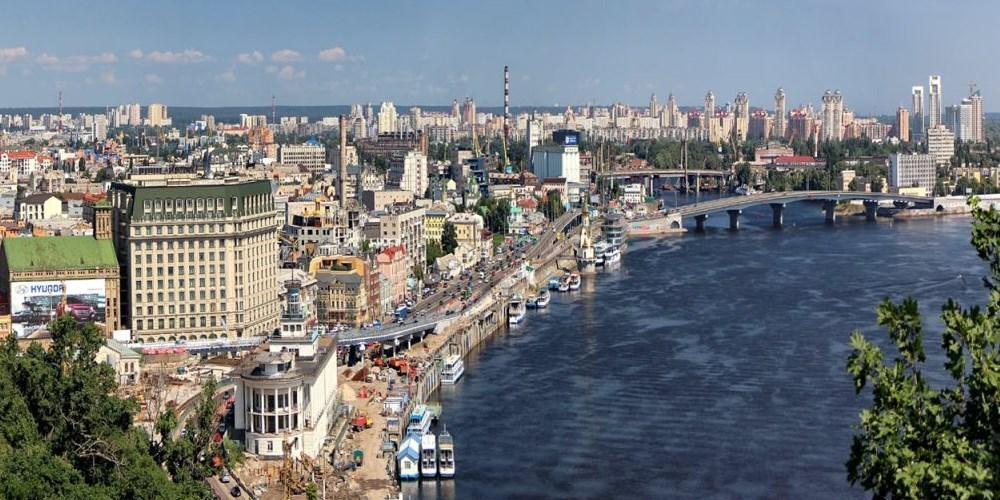Kyiv, Ukraine, September 9, 2021—Despite the unprecedented challenges of a global pandemic, IFC's investment and advisory programs have been supporting Ukraine's private sector by improving its access to sustainable finance and reliable digital financial services. These engagements are part of IFC's broader strategy to improve the country's business climate and boost trade competitiveness in infrastructure, agriculture, energy, and health-care sectors while supporting Ukraine's resilient recovery.

Over the past fiscal year, ending June 30, IFC stepped up its sustainable finance activity, providing approximately $135 million in long-term finance and around $65 million under the Global Trade Finance Program (GTFP), aimed at facilitating trade flows, promoting green finance, helping municipalities meet their critical infrastructure needs, and supporting climate-smart agriculture projects in Ukraine.
"Amid the challenges posed by the pandemic, IFC continues to focus on catalyzing the private sector to foster a green and resilient recovery in Ukraine," said Wiebke Schloemer, IFC's Director for Europe and Central Asia. "We are committed to supporting the transformation of the country's business environment, which is key to sustainable and inclusive economic growth."
In addition to its investments, IFC provided advisory services to government agencies and industry associations to help improve the business environment and investment policy through reforms and programs aimed at a strong private sector-led transformation of priority sectors. IFC's advisory work focused on climate change mitigation and adaption, while helping clients improve their environmental, social, and governance (ESG) standards to attract economically and environmentally sustainable investments.
"IFC in Ukraine is at the forefront of climate finance," said Jason Pellmar, IFC's Regional Manager for Ukraine, Belarus, and Moldova. "We will continue partnering with the Government of Ukraine and the private sector to innovate and support the country's ambitions to become more climate resilient. IFC aims to promote the business case for private sector participation in green activities across key sectors of the Ukrainian economy."
To drive the energy transition and combat climate change:
- IFC supported Ukrgasbank to boost financing for green energy in Ukraine.
- IFC's partnership with the National Bank of Ukraine (NBU) is helping the country shift to a low-carbon economy through the introduction of sustainable finance and a focus on green finance, in line with the EU Green Deal and EU Green Bond Standards.
- IFC is also assisting financial institutions to develop new green finance products to enable small agricultural producers adopt climate-smart practices to increase productivity and revenue while helping the country tackle climate change.
To help boost infrastructure:
- IFC provided the city of Zaporizhzhia with a €35 million loan to implement a smart city platform and modernize its public transport system through deployment of greener technologies, such as battery-electric trolleybuses and electric buses.
- IFC has developed a Road PPP program, in collaboration with the World Bank, to help Ukraine attract potential investments worth around $2 billion for the implementation of six pilot projects aimed to help the country establish itself as a modern and safe logistics hub in Europe.
- Following the closing of Ukraine's first concessions of Kherson and Olvia ports in 2020, IFC is now supporting the establishment of an efficient contract management system to address any technical or ESG issues that may arise during the post-transaction period of those public-private partnership (PPP) projects.
To improve access to digital financial services:
- IFC partnered with the National Bank of Ukraine to develop a national financial inclusion strategy aimed at expanding responsible access and usage of financial services and implementing best international practices in ESG risks management.
- In addition, IFC supported the Ukrainian Association of FinTech and Innovation Companies to promote legal and regulatory reforms that can make higher-quality financial services more accessible for people.
To expand access to finance, especially for smaller agricultural producers:
- IFC supported Galnaftogaz (GNG) to help provide farmers with fuels and fertilizers during the sowing season, using a financial instrument called Crop Receipts. To reduce the country's reliance on imported coal and natural gas, we also invested in upgrading the GNG's existing network of storage terminals and filling stations, while supporting a construction of the new fast-charging stations to promote electric vehicle uptake.
About IFC
IFC—a member of the World Bank Group—is the largest global development institution focused on the private sector in emerging markets. We work in more than 100 countries, using our capital, expertise, and influence to create markets and opportunities in developing countries. In fiscal year 2021, IFC committed a record $31.5 billion to private companies and financial institutions in developing countries, leveraging the power of the private sector to end extreme poverty and boost shared prosperity as economies grapple with the impacts of the COVID-19 pandemic. For more information, visit www.ifc.org
Stay Connected
Contacts
Stay Informed
Sign up to have customizable news & updates sent to you.